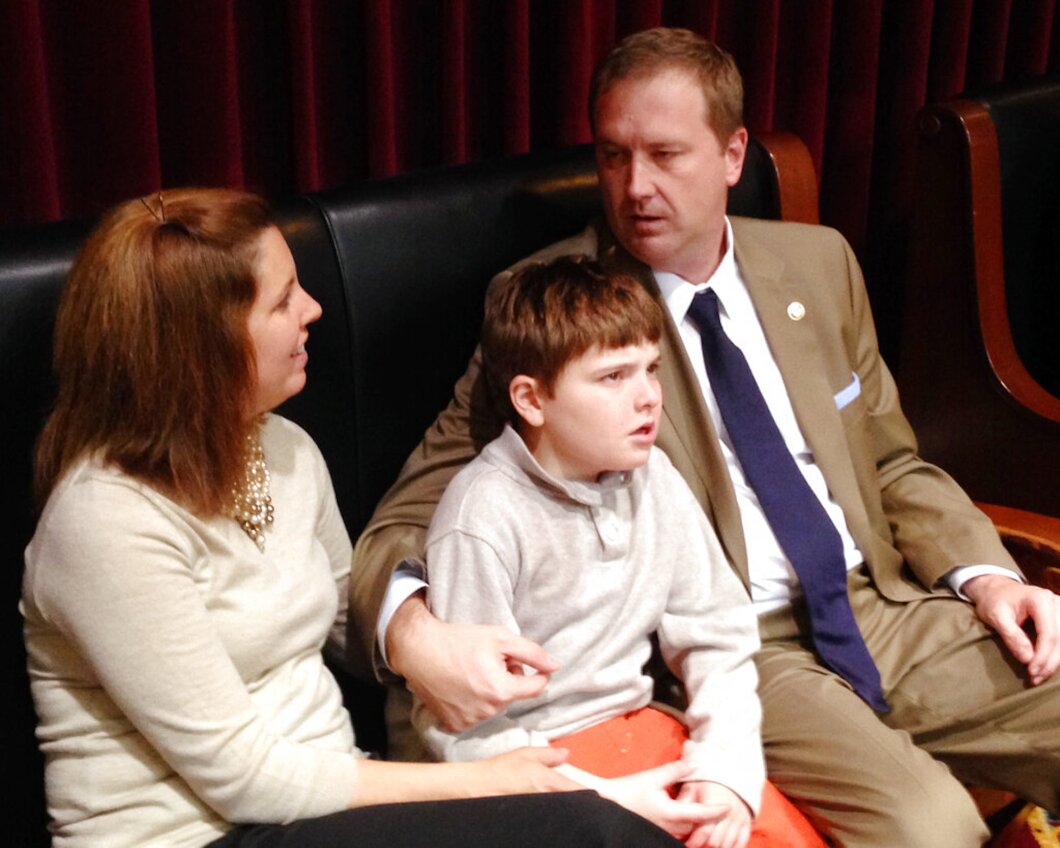
It was important to Sen. Eric Schmitt (R-MO) that his entire family was by his side as he was sworn in for his first term in the U.S. Senate in January.
That includes his wife, Jaime, and their three children: Stephen, Sophia, and Olivia. The idea makes sense on its face. Who wouldn’t want their family with them on such a momentous occasion? But for the soon-to-be senator, having Stephen there took on greater significance.
FED EXPECTED TO FORGO RATE HIKE NEXT WEEK, DESPITE HOTTER INFLATION REPORTS
“It’s impossible to overstate the impact he’s had on my whole life, worldview, motivation, everything,” Schmitt said of his son in an interview with the Washington Examiner. “I’ve had a lot of titles, but the most important job I’ll ever have is being a dad. Being a dad to Stephen is a different journey. God speaks to us in different ways, sometimes not the ways that you’re expecting, and I think that’s certainly been the story of Stephen with our family.”
To ensure that Stephen was included, the Schmitt family loaded up the car and drove 12 hours from St. Louis, Missouri, to Washington, D.C. in January for the swearing-in. Air travel is too difficult for Stephen, so the family opted for a road trip.
Stephen, 19, was born with tuberous sclerosis, a rare genetic condition that causes tumors on his organs. He was diagnosed at 5 months old, when the first-time parents took him to the dermatologist after discovering a birthmark on his leg that “looked like an angel wing.”
The dermatologist said she was concerned Stephen could have tuberous sclerosis and referred the Schmitts to a neurologist who confirmed the diagnosis. MRIs revealed that Stephen had tumors on his heart, kidneys, and brain, the latter of which Schmitt said his son had been most affected by. Stephen also has autism and is nonverbal.
Stephen, who was named for the senator’s father, began having frequent seizures after he turned 1, with the episodes occurring on a daily basis. He would experience severe episodes every couple of months, once enduring a four-hour seizure at the age of 2 that nearly put him into a coma.
Schmitt explained that his time praying for his son while in the ICU after that particular episode served as “the genesis of me wanting to do more in public service.”

“Your ego never gets too big, you really appreciate things. I think that it’s easy to take for granted, even just our ability to communicate,” Schmitt said of having an immediate family member with severe medical challenges. “Stephen has certainly made me a better person, but anybody that he comes in contact with, he has an impact on. He doesn’t have any words, but his impact speaks for itself.”
The Missouri Republican served in the state Senate for eight years, starting when Stephen was 5, before being elected as state treasurer. He went on to replace Sen. Josh Hawley (R-MO) as the state’s attorney general in 2019, and ran for the Senate last year after former Sen. Roy Blunt announced his retirement.
He delivered a number of wins for the disability community during his time in Missouri politics. The state passed a bill allowing families with a child with a disability to cover future education, housing, transportation, and other expenses through a tax-free savings account, similar to a 529 college savings program.
“Many Missourians living with a disability who are under the care of a parent or guardian will need some form of support for the rest of their lives,” he said of the effort in a statement at the time. “Caring for someone with a special need requires love and patience – and also resources. I’ve known families who have spent every resource they had, and borrowed even more, to care for a child or to reach for the dream of a breakthrough that allows them to overcome their disability.”
Schmitt also championed a major set of reforms to state law in order to force insurers to provide coverage for autism and applied behavior analysis therapy. ABA is one of the most common treatments for autism, though it is intensive, requires long-term commitment, and can be extremely expensive without insurance.
Another bill he passed allows parents and guardians to record IEP meetings, which serve as a critical road map to understanding a child’s educational needs. He pushed a state House bill through his chamber that allowed for CBD oil for medicinal use in epilepsy patients who don’t respond to conventional treatments.
“CBD oil was sort of a new frontier, but there were families that were leaving Missouri to go to Colorado to access this,” Schmitt told the Washington Examiner of the push. “The way I viewed it was, the government shouldn’t be interfering. We need to get these restrictions out of the way so families can make these important decisions about whether they want to access it or not.”
Legislating in the U.S. Senate is a different ballgame than a state capitol, something Schmitt recognizes. It’s a largely congenial body known for its bipartisan dealmaking, even in this divided political era, setting it apart from the fractious House. Schmitt says he’s bonded with Sen. Maggie Hassan (D-NH), who has a son with cerebral palsy, over their similar life experiences.
CLICK HERE TO READ MORE FROM THE WASHINGTON EXAMINER
Despite the friendliness amongst colleagues, getting federal legislation passed even on nonpartisan issues requires years of coalition building in both chambers.
The Missouri senator says he’s “still figuring out where those lanes are, but I’m definitely committed to it.”







